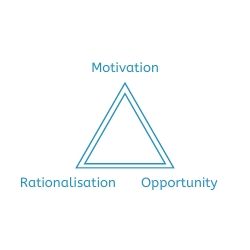With potentially the entire workforce logging on from home, many organisations will worry about timesheet fraud and consider electronic monitoring solutions. But this could be an own goal. More holistic, behavioural approaches may be a better way to both prevent fraud, and support staff.

I remember when ‘working from home’ was seen as a bit of a jolly, and greeted with wry smiles from colleagues. Now in the wake of COVID-19 it looks set to become the norm, at least for a while. Employers may worry about employees misrepresenting their time, and wonder whether they need to heighten monitoring through computers and smartphones.
There is a place for these kinds of technologies. Certain types of electronic monitoring can be prudent for certain types of work. But for many organisations – especially those new to remote working at scale – this could turn out to be a mistake. There are better ways for organisations to protect productivity and support their teams during crises like this.
Humans, not machines
 The fraud triangle, based on the work of Donald Cressey, is so robust we’re still using it 70 years after it first appeared. In this model of dishonest behaviour, a key component of fraud is rationalisation – the way that we make ourselves comfortable with what we want to do.
The fraud triangle, based on the work of Donald Cressey, is so robust we’re still using it 70 years after it first appeared. In this model of dishonest behaviour, a key component of fraud is rationalisation – the way that we make ourselves comfortable with what we want to do.
When I open my casebook of internal fraud investigations, a rationalisation that crops up repeatedly is the perpetrator’s sense that the organisation has wronged them – that the fraud would be retribution, justice, rebalancing the scales.
This is important. If an organisation adopts intrusive methods that leave employees feeling devalued and untrusted, then this can open up the possibility of that rationalisation. Combine that with financial or logistical pressure generated by the COVID-19 crisis (motivation) and the clear opportunity, and the fraud triangle is complete.
Instead, we need to think more broadly about the impact of home-working on fraud, and more carefully about human factors, before we jump to thinking about controls.
Start with a new fraud risk assessment

Sending the workforce home is a major change of circumstances – one big enough to affect your organisation’s internal fraud risk profile. Risks beyond timesheet fraud will be affected. For example:
- What could be the effect on expenses fraud?
- Will the rise in e-mail and online communication heighten vulnerability to cyber, data security, and privacy threats?
- If a health and safety assessment hasn’t been carried out on a person’s home workstation, is there a risk of false claims for which organisations may be unable to defend themselves in some jurisdictions?
It’s time for a new fraud and corruption risk assessment.
Taking a human-centric approach
 With the risk assessment providing a clear picture of what could go wrong, there may be places in which technology can help. But there are others in which we need to think about humans.
With the risk assessment providing a clear picture of what could go wrong, there may be places in which technology can help. But there are others in which we need to think about humans.
In a time where our people feel frightened and stretched, it is nurturing, caring leadership that will both support them and help to prevent and detect fraud. It’s not only possible to do both, but vital. Managers are the key controls. In retail, smiling as a customer enters can make them feel welcome – and deter shoplifters by showing they’ve been noticed. The principle is the same here. Good day-to-day remote management of employees leaves them feeling empowered and enabled, but also helps to deter, prevent and detect internal fraud.
For example:
- Train and develop managers in the potentially new task of supportive remote leadership;
- Create nurturing, mutually-problem solving relationships within teams, reducing the likelihood that people will feel the need to hide things (which can help to generate the right conditions for fraud);
- Consider online collaboration platforms. Some have amazing functionality to improve connections between remote workers, which also helps to preserve accountability;
- Provide managers with clear guidance on fraud red flags.

At the corporate level, review HR policies from an anti-fraud perspective. For example, flexible working is also about time, not just location. Business closures means that employees may now have to balance caring for children and the elderly, and seizing sudden opportunities to buy essentials, with their work-day. A flexi-time policy is a great way to prevent employees misrepresenting their work hours. Have an anti-fraud specialist examine your policies.
Meanwhile, with your employees now physically disconnected from the social norms, cues and wider internal culture that helps to regulate their behaviour, re–assess how you will manage internal culture. How will you shape how employees think, feel and act in line with an anti-fraud culture when they’re not in your building? Now might be the time to step up behaviour-shaping online materials, and anti-fraud communication and awareness initiatives.
 There are a surprising number of organisations that already embrace remote working, especially in the humanitarian and global development sector. Reach out for advice. How are they managing the risks? What has worked and what hasn’t for them?
There are a surprising number of organisations that already embrace remote working, especially in the humanitarian and global development sector. Reach out for advice. How are they managing the risks? What has worked and what hasn’t for them?
Finally, manage your own cognitive errors, biases and heuristics. Fraud and corruption love availability bias, for example, the phenomenon in which we focus on the most visibly present issues and risks. Because fraud hides and masquerades, that bias allows it to shuffle off into the darkness. Don’t let that happen. Fraud is agile and will already be adapting to this new world, you need to think about how your organisational efforts to deter, prevent, detect and respond to it will too.
Towards organisational health
Some employee monitoring solutions – especially those at the leading edge – are exciting, minimally intrusive and potentially very useful. But organisations should take care not to panic-buy. Just as with COVID-19, fighting the virus that is fraud starts with careful, risk-based preparation.
Did you find this article useful? Why not check out Oliver May’s books on tackling fraud and corruption?
Content at Second Marshmallow does not necessarily reflect the views of the author’s employer, clients or others. Check out our Disclaimer for more information.

I have been “remote working” for a numbers of years. It took almost a full year for me to find “balance”. Electronic tagging/monitoring would have seemed grossly unfair – and triggered the “rationalisation” you discuss.(and set the ground-rules for the future). It took me a long time to NOT feel guilty making a cup of tea or going to the bathroom (in case someone called and thought I was skiving) – and even longer to recognise that during the many years when i commuted and worked “at work”, there were days when just arriving in the office “justified” my salary that day – that we all have off days and good days (and spend quite a portion of every office day on banter and gossip and distraction).
My advice to “management”? Support he emotional roller-coaster a remote worker will go through and not expect them to never go to the toilet, make a cuppa, or have some gossip-time (perhaps encouraging setting-up -WhatsApp groups to keep that essential part of office life going).
LikeLike